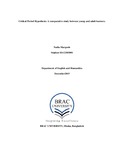Critical period hypothesis : a comparative study between young and adult learners
Abstract
Critical Period Hypothesis is one of the central aspects of language acquisition discourse. In this study through a comparative series young and adult learners have been compared on different areas of language and skills as well. Due to various reasons they learn foreign language and everyone’s comfortable and uncomfortable zones are different. Some adult learners feel easy with vocabulary whereas some young learners feel easy with speaking skills. In spite of having some differences and similarities according to them different linguistics aspect such as motivation, learner’s belief play a significant role to learn a language before and after critical period.
Keywords
English and humanities; Critical period hypothesis; Young and adult learners; Skills (reading, writing, speaking, listening); Motivation; Learner’s belief; Intelligence; NervousnessDescription
This thesis is submitted in partial fulfillment of the requirements for the degree of Bachelor of Arts in English, 2015.Department
Department of English and Humanities, BRAC UniversityType
ThesisCollections
- Thesis, B.A. (English) [647]

